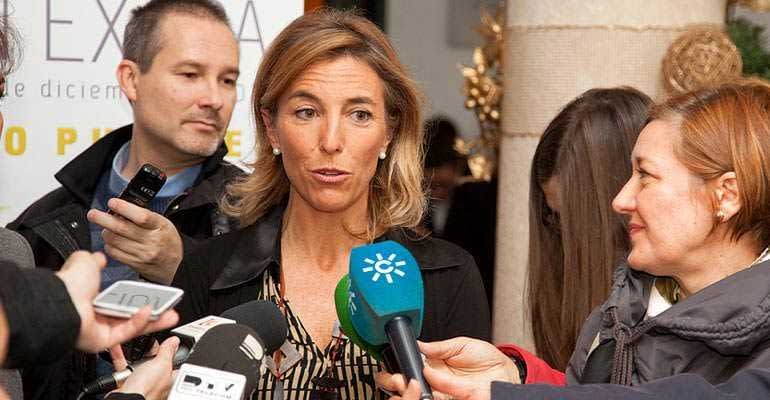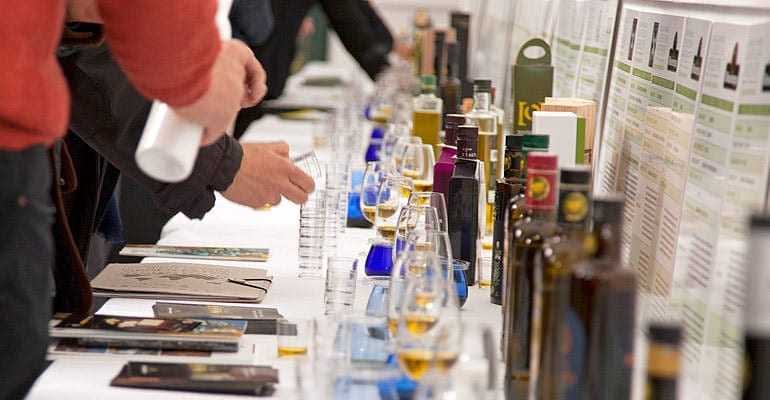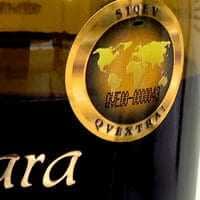
The Andalusian city of Córdoba hosted the first “International Congress of Extra Virgin Olive Oil” organized by QvExtra, an association of EVOO producers.
The program featured presentations on health, gastronomy, production and marketing — and the unveiling of a new quality certification seal.
Attending the two-day event were QvExtra members — mostly producers from Spain — seeking to distinguish their products in the marketplace by adhering to strict guidelines and displaying a gold seal that certifies olive oil to be extra virgin quality for the duration of its shelf life.
Within central Córdoba’s historic Palacio de Merced, olive oil producers said they were exasperated by the fragmented, shortsighted campaigns promoting olive oil from certain regions. QvExtra organizers called for a unified effort to promote certified extra virgin olive oils in all markets.
It was an ambitious undertaking that has been attempted before. Two years ago a similar event in Córdoba, the “Beyond Extra Virgin” conference organized by a diverse group called 3E, engaged in a bid to define the top tier of olive oil quality. Both conferences provided photo-op backdrops for regional politicians, dizzying displays of local delicacies and convincing rationale for organizing producers committed to extra virgin olive oil quality.

A number of seal programs have been developed by various organizations around the world, all with the aim of providing some confidence to consumers who have been bombarded by years of industry mudslinging, endless stories of olive oil fraud and deceptive messages from industry stakeholders.
Last October, the International Olive Council invited representatives to present their seal programs at a Madrid meeting of its Advisory Committee on Olive Oil and Table Olives. The committee heard from QvExtra and the Extra Virgin Alliance — two programs offering similar solutions to quality-minded producers.
In Córdoba, Jean-Louis Barjol, the executive director of the International Olive Council, cautioned the 200 or so attendees on the challenges inherent in establishing a quality standard with broad acceptance. “You are in a fight and there will be crises,” he said, “so you will need to approach producers’ associations and governments with a very specific proposal.” An event organizer said the IOC provided financial support to the congress.
QvExtra claims its members together produce 80,000 tons of olive oil annually, which would rank the group sixth among the world’s producing countries. “Quality is no longer a small sector,” said Manuel Heredia Halcón, QvExtra secretary, referring to the relative indifference of the Spanish government toward past initiatives to define and promote extra virgin olive oil.

Much of that heft is the production of Oleoestepa — a major Spanish cooperative that dispatches around 30,000 tons annually, and whose chief executive, Álvaro Olavarría Govantes, serves as QvExtra vice president. (Oleoestepa brands earned two gold medals at the New York International Olive Oil Competition.)
Conference attendees heard from a disparate succession of presenters: Spanish government representatives reviewed recent research (consumers still don’t know anything about olive oil), celebrated chefs discussed taste characteristics of olive varieties, producers flipped through pictures of their farms, and speakers pitched their latest projects to a captive audience. Despite a disjointed program, the event served to put QvExtra on the map, at least for now.

Near the end of the event, Heredia outlined the group’s membership criteria and technical benchmarks that products must meet in order to display the QvExtra seal — chemical parameters and taste standards that most consumers will never take the time to learn, but nevertheless which QvExtra hopes to convey through a simple gold shield with its not-so-intuitive acronym: “S‑I-Q-E‑V” (Seal International Quality Extra Virgin).
Unlike other attempts at gaining traction with quality assurance programs, QvExtra has some competitive advantages. It is the only such program originating in Spain — the world’s leading producer; it already has an impressive list of well-known members like Melgarejo, Pago Baldios San Carlos, Masia el Altet, Oro del Desierto, Casa de Hualdo, O‑Med, Oro Bailen and Almazaras de la Subbetica; and it has won, at least to some degree, backing by the International Olive Council.
Whether or not the initiative succeeds in making a difference in the marketplace remains to be seen, but the game is on. With no less than $12 billion in global olive oil sales at stake, QvExtra has formally announced its bid to conveniently identify for consumers extra virgin olive oils that can be trusted.
